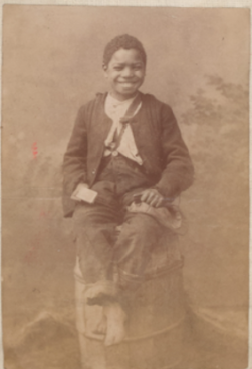Black History Month

In recognition of black history month the story of Arthur, a young resident of the Charity admitted in April 1892 is well worth re-exploring. Part of Arthur’s story has been recorded previously in this blog but didn’t include this wonderful photograph: M189/9/2/1 emigration book Arthur’s entry in the 1892 admission book originally drew attention with an interesting reference to his father as: ‘ coming over from Africa with “General Tom Thumb” and having settled in Manchr ’ [Manchester]. Charles Sherwood Stratton, more widely known as General Tom Thumb was a popular performer under the management of P.T Barnum in the mid nineteenth century and travelled widely around the world. M189/5/1/1/2 from admission book entry 23 April 1892 As shown in the admission book above, Arthur was aged 11 when he came into the Charity’s care. His mother had died and it seems his father was no longer working in entertainment, according to the admission book he was, ‘ selling papers and porterin...





